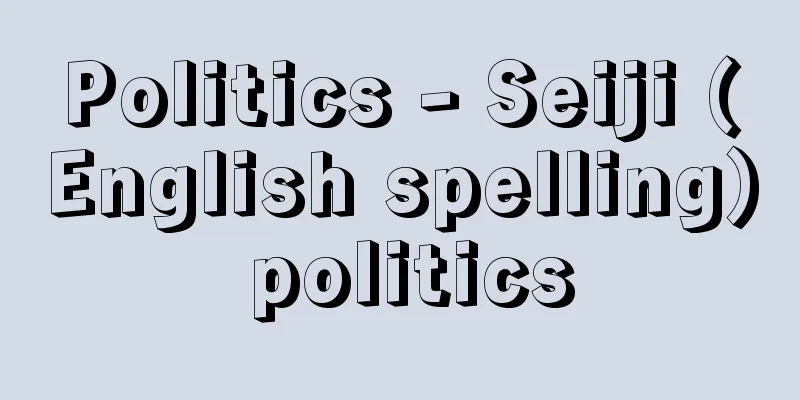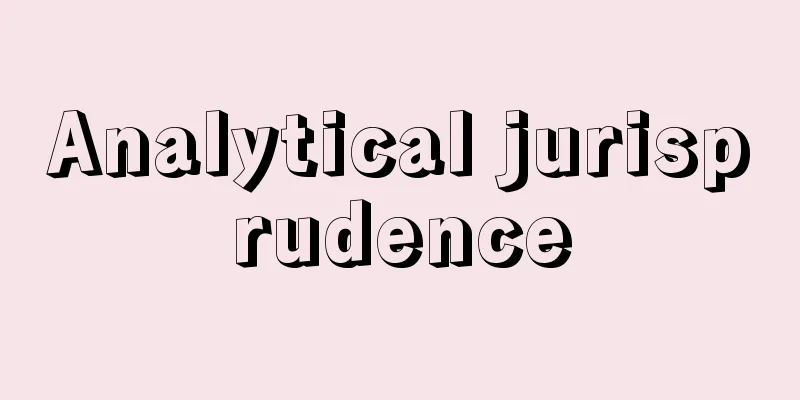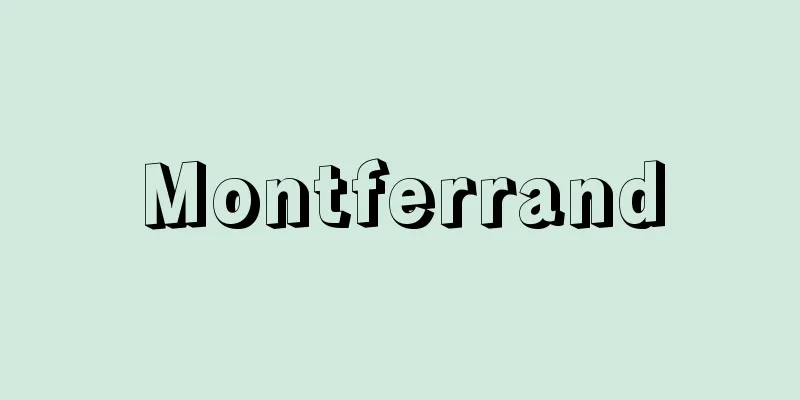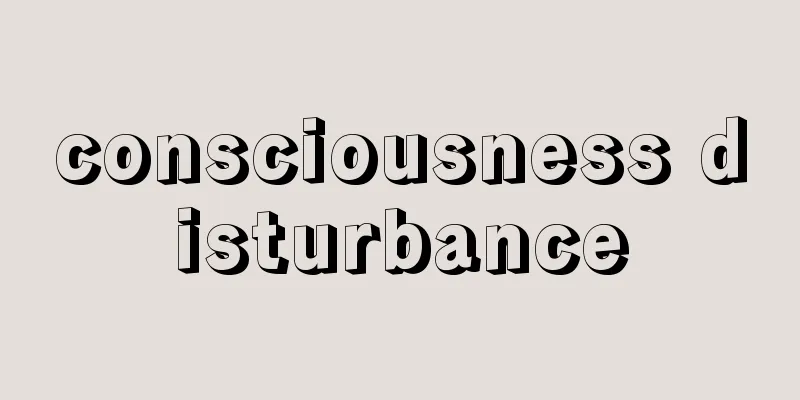Politics - Seiji (English spelling) politics

|
The Western word for politics comes from the ancient Greek city-state polis, and the derived word polliteia (citizenship, state) and other related words. The English word politics was originally used as an insult to the activities of people who formed cliques or factions, but with the establishment of modern party and representative systems, this derogatory meaning disappeared. However, even today, the word politics still has the association of "dirty work" in English, and low-quality politicians are sometimes called politicians to distinguish them from statesmen. Furthermore, the English word politics can refer to the reality or process of politics, as well as the political science that studies it. The German word Politik can mean both politics and policy, and since there is no separate word for policy like in English, it is important to be careful which one is meant. [Yoshiaki Iizaka] What is politics? Concept and definitionThe answer to the question of what politics is or what it means varies depending on the experience and concerns of the observer or researcher. Furthermore, it is influenced by the etymological meaning of the word politics itself. As we have already seen, the Western word for politics originated from polis (city-state), and the view that politics is the work of the polis, that is, the work of the state, has spread. Even if politics is considered to be the governing act of the state, the form and character of the state have changed over history, so it is more generally understood as a word that describes the execution of tasks and the handling of problems necessary for human public or communal life. Therefore, whether politics should be seen as something specific to the state, or whether it should be seen as politics in places where humans live in groups, depends on the observer's concerns. The former position is sometimes called the "political state phenomenon theory" and the latter the "political group phenomenon theory," but even if one takes the latter position, there is no disagreement that politics appears typically and intensively in the most institutionalized group, the state. In any case, it can be said that the idea that politics is not limited to the nation-state, but is a phenomenon that is found in international society or various groups, is becoming more common today. Today, politics is generally viewed as a "group policy (decision-making) process" or defined in a similar way. In this case, "group" is of course not limited to nations and local governments, but also includes various social groups and national and international organizations. In a broad sense, the "policy-making process" refers to the entire process of selecting goals, deciding how to achieve them, and implementing or executing them. "Policy-making" is sometimes expressed as "policy formation," and "decision-making" is sometimes expressed as "decision making." Policy-making and decision-making are sometimes used interchangeably, but decision-making has a broader meaning. Policy-making is often used in reference to government actions, and when the word "decision-making" is used in reference to politics, for example, elections are a decision-making process, but they are not policy decisions in the narrow sense. However, when the term "policy-making process" refers to the entire political process, elections, which support policy makers, are also included as part of it. In any case, the view of politics as a policy-making process can be said to be a definition of politics based on the behavioral or modern political science approach, which emphasizes political dynamics and processes, as opposed to the static, institutional view of politics in traditional political science. This view of politics is represented by H. Lasswell, but another leading American political scientist, D. Easton, defines politics as "the authoritative allocation of values to society." This is similar to Lasswell's definition of politics, because formally speaking, politics is a "policy-making process," and in terms of content, it is an "authoritative allocation of values." Thus, the defining feature of a behavioral definition or perspective of politics is that it does not explain politics from the perspective of the institution or structure of the "nation," but rather tries to explain the "nation" from the perspective of the political process or function. And as long as the function of politics is recognized, even "primitive societies" or "tribal societies" that cannot be called "nations" can be the subject of political research. [Yoshiaki Iizaka] The essential features of politicsThe concept and definition of politics must include the meaning of politics, or the essential characteristics that make politics politics. By the way, when looking at politics from the perspective of policy (decision-making), the issue of "power" naturally becomes relevant. This is because, according to Lasswell, "power" is nothing other than "participation in decision-making." From this perspective, "politics" is a "power process" and cannot be thought of without the fluid situation of "power relations." There are various ways to participate in the decision-making process and exercise influence, ranging from the use of violence and inducement of interests, to rational persuasion, propaganda, and symbol manipulation. Therefore, essential elements of politics include violence or power, interests and values, information and knowledge, and ideas and ideology. In addition, organizations and groups that combine and exercise these elements, as well as rules, procedures, and systems for the power struggle that takes place over the making of such decisions, are also essential to politics. Politics is a decision-making process that revolves around and is based on power, but power relations are extremely fluid and changeable, and as the nature of society changes from a civil society stage to a mass society and then to an information society, the consciousness and interrelationships of people in society become increasingly fluid, and the basis and nature of power also change. For example, today the mass media has a major influence on policy decisions. Political issues also change as society changes. For example, with the emergence of affluent societies, political issues shift from issues over economic and material benefits to a review of "quality of life" or lifestyles, such as meaning in life and environmental issues, and to policies related to welfare and the creation of meaning in life in an aging society. In politics, while we see the above-mentioned constant fluidity and situationalization, at the same time, a process of institutionalization is underway that seeks the legitimacy of authority and the stability of order. In this process, the differentiation of roles and functions, such as between rulers and the ruled, and between the elite and the masses, becomes fixed. Thus, the more situationalized politics becomes, the more unstable it becomes, and if institutionalization progresses too far, politics becomes rigid and voluntary political participation declines. A balance between the two is important in politics. In today's politics, we see a dilemma: on the one hand, the broader the scope of political participation, the more the bureaucracy grows and the more controllable it becomes. There is also a contradiction in that the more political apathy grows on the one hand, the more the movement for political radicalism advances on the other. Furthermore, in modern politics, while the private life of the individual becomes more and more private and depoliticized, the politicization of society progresses and everything is incorporated into politics. As the "lonely crowd" grows, "group eruptions" occur everywhere, each of which has an impact on the political process. Politics is a struggle over values and goals, as well as a struggle over the choice of means and methods. Incidentally, it is "myth" that provides values and goals for politics, and "technology" that provides means and methods. From this perspective, as R.M. McIver says, politics is a complex of myth and technology, and neither can be lacking. Myth appeals to human irrational will and emotion in the form of ideology and belief, while technology appeals to human rationality, whether it is natural science technology or social technology such as organization and institutionalization. Various political rituals are created to instill myths in people, and theatrical effects are heightened. On the other hand, technology prioritizes efficiency as an effective means, and sometimes promotes dehumanization such as dictatorial rule and genocide. Thus, since politics contains contradictory elements within itself, has the ambiguity of serving both angels and devils, and has the serious aspect of decisively influencing the fate of human beings, it is essential to identify the true nature of politics and deal with it appropriately. As already mentioned, politics is a collective decision-making process for maintaining and perpetuating human social and collective communal life, and this activity improves human living conditions and develops the social environment. This is called the eufunction of politics, and any political action that works against this is called dysfunctional politics. Needless to say, promoting the eufunction of politics is the responsibility of all people living together. Politics, which aims to improve the deficiencies of the current situation and create a better environment for human communal living, has future-making as an essential feature. Politics is deeply related to shaping the future. Moreover, today, predictions and plans for shaping the future can be made much more accurately and quickly than ever before, thanks to the collection and processing of the necessary information. However, it cannot be denied that shaping the future always involves more or less risk. Therefore, politics always involves an element of gambling and requires decisions. The element of decision-making in politics is particularly important in times of crisis. When we avoid taking bets on creating the future, politics becomes conservative and status quo-oriented, and we end up inviting crisis ourselves. Today, when we are said to be at a turning point in history, it is necessary to pay renewed attention to the future-shaping function of politics. Today, it is necessary to emphasize that politics has global implications as well as a connection to the future. [Yoshiaki Iizaka] [Reference] |Source: Shogakukan Encyclopedia Nipponica About Encyclopedia Nipponica Information | Legend |
|
政治を表す西欧の語は、古代ギリシアの都市国家であるポリスpolis、およびそれから派生したポリテイアpoliteia(市民権、国家)その他の関連語に由来する。英語のポリティックスpoliticsは、初め徒党や派閥を組む人々の活動に対する悪口として用いられたが、近代の政党制、代表制の確立とともに非難めいた意味はなくなった。しかし今日でも、英語では、政治といえば「汚い仕事」という連想が残っており、低劣な政治家をポリティシャンpolitician(政治屋)とよんで、ステーツマンstatesman(国士)と区別することがある。さらに英語のポリティックスについていえば、それは、政治の現実ないし過程を表すとともに、それを研究する政治学を意味することもある。またドイツ語のポリティークPolitikは政治と政策の両方の意味があり、英語のようにポリシーpolicy(政策)という別の語をもっていないから、そのいずれを意味するかに注意しなければならない。 [飯坂良明] 政治とは何か―概念と定義政治とは何か、あるいは政治とは何を意味するかという問いに対する解答は、観察者、研究者のもっている経験や問題意識によって異なる。さらにまた政治ということばそれ自体がもっている語源的な意味に影響される面がある。すでにみたように政治にあたる西欧語は、ポリス(都市国家)に由来したところから、政治をポリスの業務、すなわち国家の仕事として考える見方が広まるようになった。このように政治を国家の統治行為とするとしても、国家の形態や性格は歴史とともに変化してきているので、より一般的に、人間の公共生活あるいは共同生活に必要な業務の遂行や問題の処理を表すことばとして理解されている。そこで、政治を、国家に特有のものとして限定的にみるか、それとも、人間が集団生活をするところ、そこに政治があるとみるべきかは、観察者の問題関心によって異なる。前者の立場を「政治国家現象説」、後者を「政治集団現象説」とよんで区別することがあるが、後者の立場をとる場合でも、政治が国家というもっとも制度化された集団のなかにおいて典型的、集約的に現れることについては異存がない。ともあれ今日では、政治は国家にとどまらず、国際社会やあるいは各種の集団にみられる現象であるという考え方がより一般的となりつつあるといえよう。 今日では、政治を「集団の政策(意思)決定過程」とみる見方、あるいはそれに類した規定の仕方が一般的に行われている。この場合の「集団」はもちろん国家や地方自治体にとどまらず、いろいろな社会集団や、国内的、国際的団体を含む。また「政策決定過程」とは、広義には目標の選択、目標達成方法の決定、そしてそれらの実施あるいは実行の全過程を表す。「政策決定」policy-makingは「政策形成」と表現される場合もあり、また「意思決定」decision-makingは「決定作成」という表現が用いられることもある。政策決定と意思決定とは同じ意味に用いられることもあるが、意思決定のほうがより広い意味に用いられている。政策決定は政府の行為に関して用いられることが多く、また、政治に関して意思決定の語が用いられる場合、たとえば選挙は一つの意思決定過程ではあっても、狭義における政策の決定ではない。けれども、政治過程全体をさして政策決定過程という場合には、政策決定者を支持するものとしての選挙もその一部に含まれる。いずれにしても政治を政策決定過程とみる見方は、伝統的政治学の静態的、制度論的な政治の見方に対して、政治の動態や過程を重視する行動論的政治学あるいは現代政治学とよばれる立場にたつ政治の定義であるといえよう。この政治の見方はH・ラスウェルによって代表されるが、もう1人の代表的なアメリカの政治学者D・イーストンは、政治を「社会に対する価値の権威的配分」と定義した。これもラスウェルの政治の定義と同工異曲である。というのは、政治は、形式的にいえば「政策決定過程」であり、内容的にいえば「価値の権威的配分」ということになるからである。 こうして、政治を「国家」という制度・構造から説明するのではなく、逆に「国家」を政治という過程・機能から説明しようとするところに行動論的な政治の定義ないし見方の特色がある。そして政治という機能が認められる限り、それが「国家」とはいえないような「原始社会」や「種族社会」であっても、これを政治研究の対象とすることができる。 [飯坂良明] 政治の本質的特徴政治とは何かという政治の意味、あるいは政治をして政治たらしめる本質的特徴が、政治概念、そして政治の定義には含まれていなければならない。 ところで、政治を政策(意思)決定という角度からみる場合、そこに当然「権力」の問題が関連してくる。なぜなら「権力」はラスウェルによれば、「意思決定への参加」にほかならないからである。この面からいえば、「政治」は「権力過程」であり、また「権力関係」という流動的な状況を抜きにしては考えられない。決定作成過程に参加し影響力を行使するには、暴力行使や利益誘導、さらには理性的説得から宣伝やシンボル操作に至るまで種々の方法がある。したがって、政治にとって不可欠な要素としては、暴力ないし実力、利益や価値、情報や知識、そして思想やイデオロギーなどがあり、またこれらのものを組み合わせて行使するための組織や集団、さらにこうした決定作成をめぐって権力闘争が行われる際のルールや手続、制度なども政治には不可欠である。 政治は権力をめぐる、そしてまた権力を基礎とした決定作成過程であるが、権力関係はきわめて流動的、可変的であって、市民社会の段階から大衆社会、情報化社会へと社会の性格が変化するにつれて、社会の人々の意識や相互関係がますます流動化し、権力の基盤や態様も変化する。たとえば、今日ではマス・メディアが政策決定に大きな影響を及ぼすに至る。また社会の変化につれて政治の争点も変化する。たとえば、豊かな社会の登場とともに、経済的、物質的利益をめぐる争点から、生きがいや環境の問題といった「生活の質」あるいはライフ・スタイルの見直し、そして高齢化社会における福祉や生きがいの創出などに関連する施策に、政治の争点は移行する。 政治においては、以上のような絶え間ない流動化、状況化がみられるとともに、他方で権威の正統性や秩序の安定を求める制度化の過程が進行する。この過程のなかで支配と被支配、エリートと大衆といった役割や機能の分化が固定化される。こうして政治においては状況化が進めば進むほど不安定となり、制度化が進みすぎると政治は硬直化して自発的政治参加が低下する。政治には両者のバランスがたいせつである。 今日の政治では、一方で政治参加の幅が広がれば広がるほど、他方で官僚制が肥大し管理化が進行するという二律背反がみられる。 また一方で政治的無関心が増大すればするほど、他方で政治的ラディカリズムの運動も進行するという矛盾がみられる。 さらにまた、現代の政治では、個人の私生活化、非政治化が進行するとともに、社会の政治化が進展してあらゆるものが政治に組み入れられていく。「孤独なる群衆」の増大とともに、「集団の噴出」が至る所におこって政治過程にそれぞれ影響する。 政治は、価値や目標をめぐる闘争であるとともに、手段や方法の選択をめぐる闘いでもある。ところで、政治に価値や目標を提供するものが「神話」であり、手段、方法を提供するものが「技術」である。こうした観点からいえば、政治はR・M・マッキーバーのいうように、神話と技術の複合体であり、そのどちらを欠くこともできない。神話は、イデオロギーや信念という形で人間の非合理的な意思や感情に訴え、技術は、それが自然科学的技術であるにせよ、組織化、制度化といった社会的技術であるにせよ、人間の合理性に訴えかける。神話を人々に植え付けるために種々の政治的儀式がつくりあげられ、演劇的効果が盛り上げられる。他方、技術は有効な手段としての効率を優先させ、ときとして独裁的支配や大量虐殺といった非人間化を促進することがある。 こうして政治は、自己のうちに二律背反的要素を含み、天使にも悪魔にも奉仕するというあいまいさをもち、しかも人間の運命を決定的に左右するという深刻な側面をもっているから、政治の本質を見極め、これに正しく対処することが不可欠である。 ところで政治は、人間の社会的、集団的共同生活を維持し、存続させるための共同的決定作成過程であることはすでに述べたが、この営みによって人間の生活条件が改善され、社会的環境の整備が図られる。これを政治の順機能とよび、これに逆行するような政治の働きを政治の逆機能という。いうまでもなく政治の順機能の促進は、共同生活を営むすべての人の責任である。 政治は、現状の不備を改善し、人間の共同生活のためのよりよい環境を形成するという目的を志向するものとして、未来づくりをその本質的特徴の一部とする。政治は未来の形成に重大な関係をもつ。しかも今日では、未来形成のための予測や計画が、それに必要な情報の収集や処理によって、従来よりもはるかに正確かつ迅速になされるようになった。けれども未来形成にはつねにまた多かれ少なかれリスクが伴うことも否定しえない。したがって政治にはつねに賭(か)けの要素があり、決断を必要とする。とりわけ危機的状況においては政治における決断の要素が重要となる。未来づくりのための賭けを回避するとき、政治は守旧的、現状維持的となり、自ら危機を招くに至る。 歴史の転換期にたたされているといわれる今日、政治のもつ未来形成的機能は改めて注目される必要がある。今日、政治はグローバル(地球的)なかかわりをもつとともに、未来へのかかわりをもつことが、強調されなければならない。 [飯坂良明] [参照項目] |出典 小学館 日本大百科全書(ニッポニカ)日本大百科全書(ニッポニカ)について 情報 | 凡例 |
Recommend
Silver mirror reaction - Ginkyouhannou (English spelling) silver mirror reaction
This is a detection reaction for reducing organic...
Oslo International Peace Research Institute - Oslo International Peace Research Institute
A private organization that conducts research to ...
Shichiri-to - Shichiri no Watashi
The only sea route on the Tokaido that ran between...
Construction industry
A business that mainly carries out construction w...
Arima [Hot Springs] - Arima
It is located in Kobe City's Kita Ward, at an ...
Macroglobulinemia - Macroglobulinemia
A condition in which macroglobulins are increased ...
Need a horse-riding lodge?
During the Edo period, this was a tax levied on t...
Yoshifuru Kaibara
1664-1700 A Confucian scholar in the early Edo pe...
Ichijo school - Ichijoha
…Six of Ryochu's disciples also established t...
the red ensign
…The Royal Navy's naval ensign, the White Ens...
Rotary kiln - Rotary kiln (English spelling)
A general term for rotary kilns, which are genera...
Astragalus adsurgens (English spelling)
… [Hiroyoshi Ohashi]. … *Some of the terminology ...
history
…the word history comes from the Greek word histo...
Metaphysics (English spelling)
A branch of philosophy that critically examines ba...
Champlevé enamel - Champlevé enamel
...When the finished product is finished with a m...



![Oxford Down [seed] - Oxford Down](/upload/images/67cfd3d2e37ce.webp)





